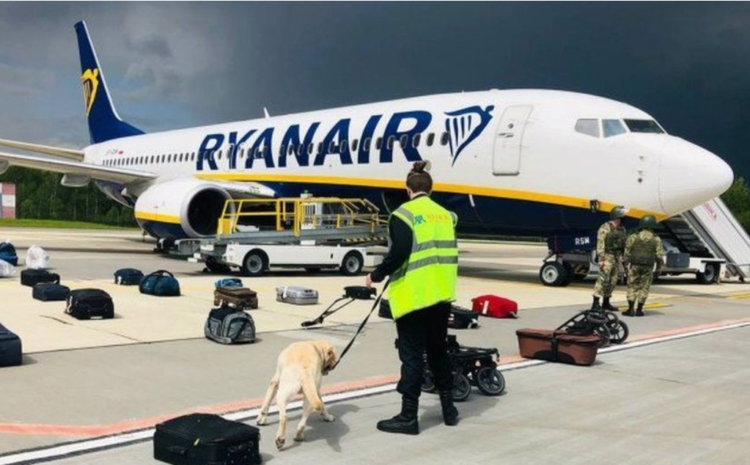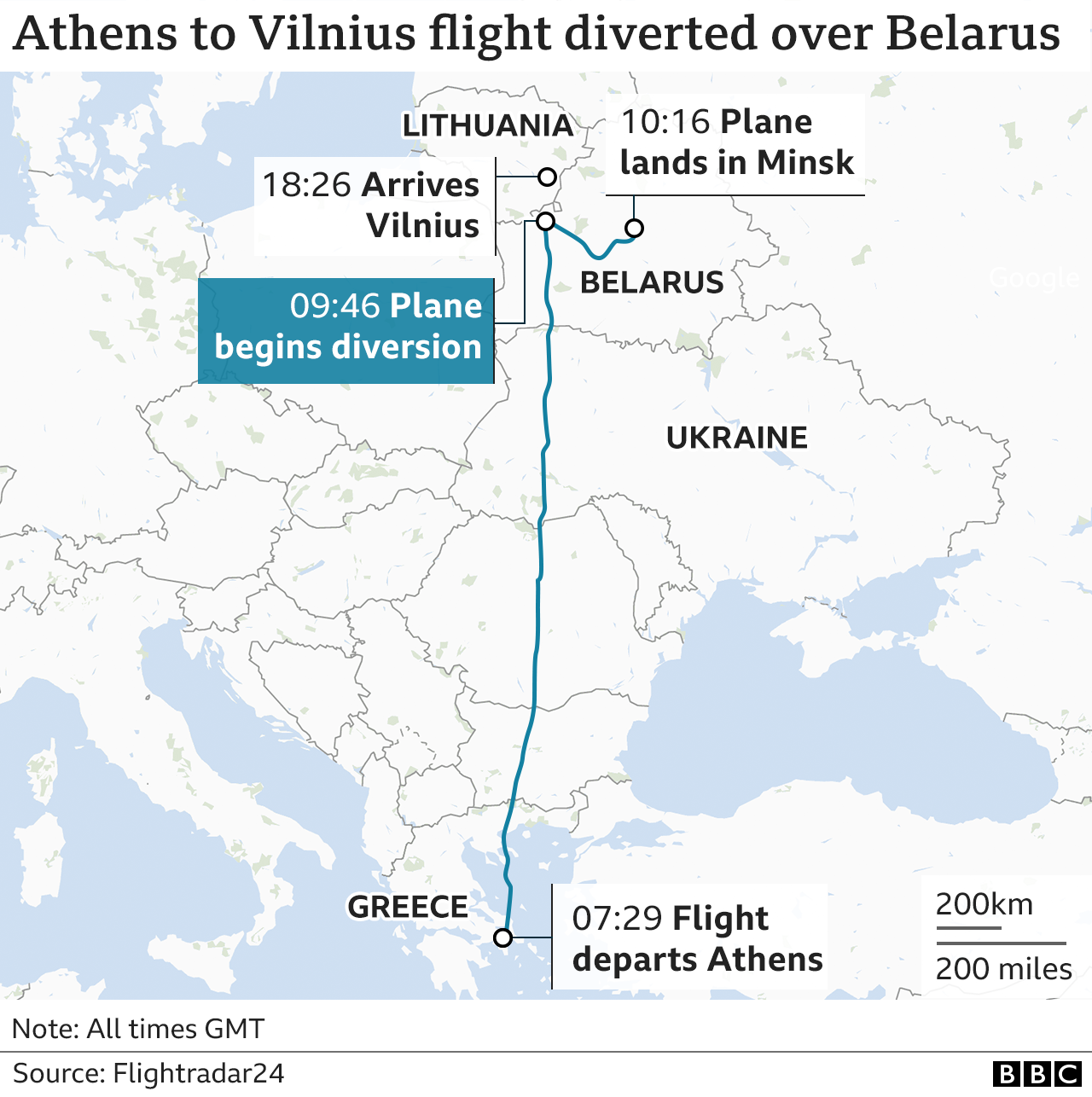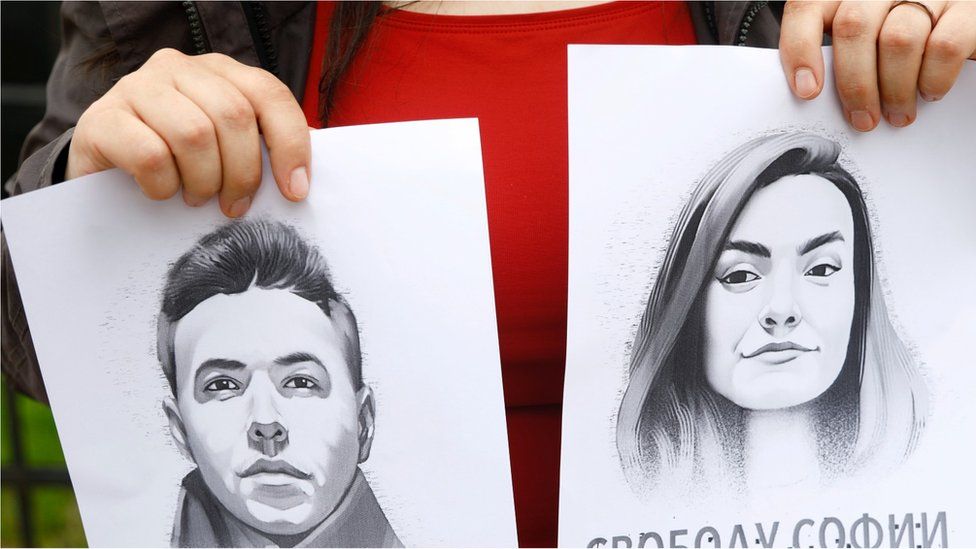
HO VIA EPA image captionRyanair flight FR4978 was travelling from Athens to Vilnius on 23 May when it made an abrupt change of course land in Minsk, Belarus
The pilot of a flight that was diverted to Belarus, allowing the arrest of an opposition journalist, had been warned that a bomb would detonate if it continued to Lithuania, according to Ryanair’s boss.
Michael O’Leary said the pilot tried to seek advice from the airline, but was given false excuses by officials that Ryanair was not answering the phone.
He called the incident “a premeditated breach” of global aviation rules.
Belarus denies it was a forced landing.
Journalist Roman Protasevich and his girlfriend Sofia Sapega were arrested after the plane landed in Belarus’s capital Minsk. Both remain in prison.
Ryanair flight FR4978 was travelling from the Greek capital, Athens, to Vilnius in Lithuania on Sunday 23 May when it made an abrupt change of course over Belarus, some 10km (six miles) from the Lithuanian border.
The incident has drawn condemnation from the EU, UK and other Western nations. They reacted by banning state carrier Belavia from their airports and ordering airlines to avoid Belarusian airspace.
In a detailed account, Mr O’Leary told a British parliamentary committee on Tuesday of the series of events that led to the plane’s diversion.
He said Minsk air traffic control told the pilot they had received “a credible threat that if the aircraft entered Lithuanian air space, or attempted to land at Vilnius airport… a bomb on board would be detonated”.


The pilot “repeatedly” requested to speak to Ryanair’s operations control centre after the bomb threat came through, but “Minsk gave excuses that Ryanair in Poland were not answering the phone”, he said.
Mr O’Leary explained that flights in this area would normally be diverted to Poland or the Baltic states, but that the pilot was given no option but to land in Minsk.
When the pilot asked what the threat level was, he was told it was a red alert “which gave him no alternative”, he said.
The plane was “brought down under false pretences using Minsk Air Traffic Control and it seems clear two passengers were removed against their will and detained”, he said.
 IMAGE COPYRIGHTEPA
IMAGE COPYRIGHTEPAFollowing the plane’s landing, Mr O’Leary said the crew were pressured into confirming on video that they had voluntarily diverted to Minsk but that they refused to do so.
When the plane took off again, he said there were five passengers missing – Mr Protasevich, Ms Sapega and three “unidentified persons”, whom he said he understood from security agencies to be “KGB types”.
The three individuals, who included a Greek passenger, told Belarus TV they had been travelling to Belarus anyway so decided not to go on to Lithuania.
An unverified transcript from the Belarusian transport ministry has previously shown that air traffic controllers told the pilot “you have [a] bomb on board and it can be activated over Vilnius”.
The comments by Mr O’Leary came a day after Belarus air force chief Igor Golub said there was “no interception, no forced diversion from the state border or forced landing of the Ryanair plane”.
He was speaking at a news conference in Minsk where Mr Protasevich – former editor of the opposition Nexta channel on the Telegram messaging app – also appeared. A BBC reporter who was initially at the media briefing said the 26-year-old was clearly appearing under duress.
Mr Protasevich had also made appearances on state TV in which he has praised Belarus leader Alexander Lukashenko and admitted attempting to topple him. In one appearance, marks were visible on his wrists. Human rights and opposition campaigners say he was tortured.
Mr Protasevich has been put on the Belarus terrorism list and is accused of inciting unrest. Ms Sapega – who is Russian – has been charged with inciting social discord and enmity.
Authoritarian Belarus leader Alexander Lukashenko, in power since 1994, has cracked down hard on opponents since claiming victory in an August election widely condemned as rigged. Opposition leaders have been jailed or forced into exile.
